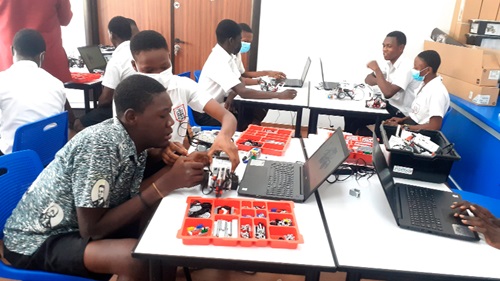
Promoting STEM education for sustainable economic development
Advancement in technology in today’s world revolves around sound science, technology, engineering and mathematics (STEM) education.
Advertisement
STEM education is instrumental for the development of any nation.
The contribution of STEM to social, industrial and economic life globally have been felt on all phases of human life.
It has become an energising elixir and necessary substance that creates spirit of economic, technological and sustainable development across developing countries, particularly Ghana.
The provision of good water supply, quality food and healthcare delivery, as well as various materials for construction in industries, roads, and automobiles are by-products of STEM education.
In actual sense, graduates from STEM education should be equipped with sufficient skills that would make them self-dependent, prepare them for the job markets and progress well.
Rationale for STEM
The skills gaps in Africa relate to numeracy, critical thinking communication, leadership, decision-making and technical capacity.
Non-cognitive skills (e.g. communication, leadership and decision-making) are becoming increasingly important as economies transform.
The important contribution of STEM as an enabler for sustainable national economic growth was affirmed at the World Summit on Sustainable Development (WSSD) in 2002.
Accordingly, it is in this regard that in the framework of the New Partnership for Africa’s Development (NEPAD), African leaders recognised that science and technology will play a major role in the economic transformation and sustainable development of any nation.

Students during a typical STEM lesson
STEM education is used in research, policy issues, teaching for innovation, problem-solving and prospects.
According to development visions, a significant policy document, development in low or lower middle-income countries in sub-saharan Africa tends to follow similar patterns.
These countries pursue industrialisation and economic diversification so that their economies can grow.
Manufacturing and services industries which are critical for industrialisation require knowledge of mathematics and science.
Scholars in developed countries proposed that the teaching of STEM at secondary education level should be integrated into one subject under the guise of STEM.
The main motivation for an integrated STEM discipline at senior high school level was a response to vocational needs and economic aspirations.
However, this approach has been criticised for lacking clarity and undermining technology training.
Moreover, the individual components of STEM are based on different epistemological assumptions, and these differences should be respected.
Globalisation and the rapid development of ICT are transforming society.
Consequently, STEM is necessary to meet the demands for 21st-century workplaces.
It is expected that schools will be required to make curricular changes in order to prepare students for the knowledge society and in addition it may be necessary to redefine what should be included in the core secondary school curriculum.
Advantages of STEM education
The complexity of today’s world requires all people to be engaged with new set of core knowledge and skills, to solve difficult problems like novel coronavirus pandemic, gather and evaluate evidence and make sense of information they receive from varied print and increasingly digital media.
It is, therefore, clear that the learning and doing of STEM help develop skills and prepare students for a workforce where success results not just from what one knows but what one is able to do with the knowledge.
STEM had been the critical instruments used to uplift not only the standard of living but the economy of any nation.
STEM education is important in meeting societal needs like food, shelter, clothing, water, energy, employment, basic education, health care, defence and security, governance, etc.
Modern industries depend on basic science for its supply of innovations.
The support of pure science is justifiable because it will lead eventually to economic benefits through improved industrial products or processes.
This is why nations continue to invest huge amount of resources in research and development in STEM education and training.
This investment is seen as strategic because of the importance of these disciplines to national development.
STEM global initiative has attracted several countries of the world for its development.
These countries believe that with STEM knowledge, they can rise above over-dependence on developed countries technological prowess.
Recommendations
The role of STEM education as a tool in national development is factual.
STEM education is a springboard for Life-long skills in individuals that can enable them to add significantly to the development of the society.
The application of mathematical concepts has helped in advancing science, technology and engineering, thus sustaining the development of our nation.
Furthermore, the more the number of individuals having STEM education, the more the worth of the individuals and the level of development of the society and the result is overall national development.
It is, therefore, envisaged that with sound STEM education, sustainable national development can be achieved.
For education to achieve all ends, it has to be carefully planned, the plan must take into consideration the needs of the society, the political, socio-cultural, economic, military, scientific and technological realities of the environment are very important to its development.
There is need to improve on the quality of science, technology, engineering and mathematics teaching in schools so that learners can gain knowledge, skills and competencies needed for the gradual but lasting national development.
The government should avail the general populace with sound STEM education for rapid national development.
The writer is a PhD candidate, University of Ghana
Email: [email protected]




